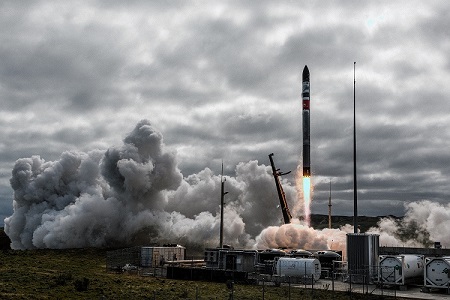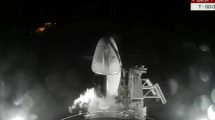 Rocket Lab launched a dedicated Electron mission for Capella Space (Capella). The mission demonstrated several significant milestones for Rocket Lab’s reusability programme, including an ocean splashdown of the Electron rocket’s first stage and the successful flight of a previously flown Rutherford engine. The mission was also Rocket Lab’s 40th Electron launch since the company began launches in 2017, further cementing Electron’s position as the leading commercial small launch vehicle globally.
Rocket Lab launched a dedicated Electron mission for Capella Space (Capella). The mission demonstrated several significant milestones for Rocket Lab’s reusability programme, including an ocean splashdown of the Electron rocket’s first stage and the successful flight of a previously flown Rutherford engine. The mission was also Rocket Lab’s 40th Electron launch since the company began launches in 2017, further cementing Electron’s position as the leading commercial small launch vehicle globally.
The ‘We Love The Nightlife’ mission lifted-off from Rocket Lab Launch Complex 1 on New Zealand’s Mahia Peninsula, deploying Capella’s next-generation Acadia satellite for its synthetic aperture radar (SAR) constellation to a 640km circular low Earth orbit.
As a recovery mission, Electron’s first stage returned to Earth under a parachute after launch and splashed down in the Pacific Ocean several hundred kilometres down range from Launch Complex 1. Rocket Lab’s marine recovery vessel will soon extract the stage from the ocean and transport it back to Rocket Lab’s production complex for analysis and testing to inform future recovery efforts. In addition to recovering the booster, Rocket Lab launched a pre-flown 3D-printed Rutherford engine for the first time.
The mission follows on from Rocket Lab’s two previous launches for Capella, including the “Stronger Together” mission launched in March 2023 from Rocket Lab Launch Complex 2 in Virginia, and the “I Can’t Believe It’s Not Optical” mission in August 2020 from Launch Complex 1 in New Zealand, which deployed the first satellite in Capella’s SAR constellation. ‘We Love the Nightlife’ was the first of four new dedicated launches on Electron for Capella, announced in February 2023, to deploy Capella’s next-generation Acadia satellites.
Rocket Lab founder and CEO, Peter Beck, said: “We’ve been a trusted launch partner to Capella since 2020 and we’re delighted to deliver mission success once again. Electron has played a crucial role in helping constellation operators like Capella deploy their spacecraft on time and on target, and we look forward to continuing building out Capella’s constellation with more dedicated launches this year. Congratulations also to our team on delivering 40 Electron launches, completing another booster recovery, and proving Rutherford engines can be flown multiple times. One mission is an enormous achievement in this industry, but 40 is a rare achievement and testament to the relentless drive, innovation and dedication of the Rocket Lab team.”
Capella’s existing satellite constellation delivers the highest quality and resolution SAR imagery commercially available, with the ability to penetrate all weather conditions and capture clear imagery 24-7, day and night, delivered through a fully-automated ordering and delivery platform. The next-generation Acadia satellites include several enhancements, including increased bandwidth and power and faster downlink speeds. When combined with Capella’s existing long-dwell imaging capability and extended duty-cycle – which results in more images collected per orbit than other SAR systems – Acadia will continue to set the benchmark within the SAR industry.












Add Comment